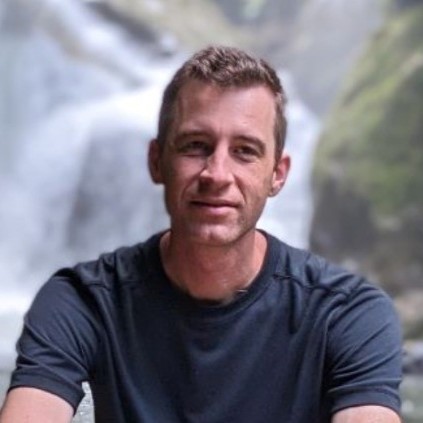Permaculture, Conspiracy and Dog Politics in Rural Bolivia
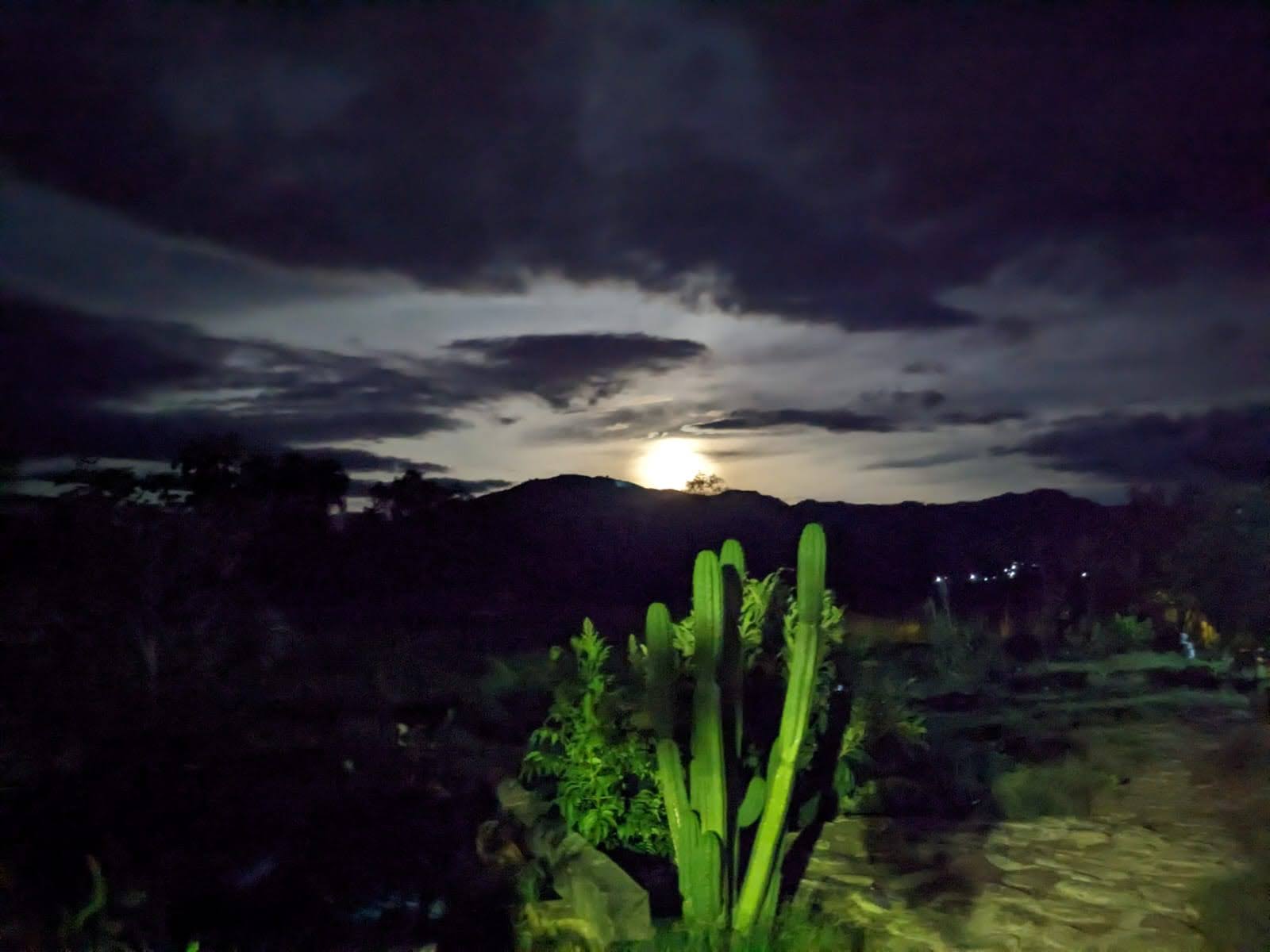
We expected our time in Bolivia to be a cultural experience. But we didn’t expect to be immersed in dog society — or an emerging brand of green conservatism.
Note: I’ve withheld the names of our hosts, their neighbors, and our fellow volunteers out of respect for their privacy. For the dogs, since I don’t think they’d mind, I used real names.
Brown Dog
Brown Dog, as we referred to him, made his home at the permaculture farm in a rural corner of Bolivia. No one invited him. He just showed up several days before we arrived for our fifteen-day volunteering gig at the farm.
He ingratiated himself with the other dogs, Rocky (the ringleader), Freddy (the tank), and Mason (the baby) who seemed to accept the new resident. Brown Dog slept, ate, and guarded the land with the other dogs. He would have happily lived out the rest of his days at the farm.
Brown Dog took his role as protector of the land and its human inhabitants seriously. Too seriously, in fact. The neighbors, who daily trekked the private access road along the property’s edge, didn’t appreciate Brown Dog’s vicious and menacing barking. Nor did they like how the entire pack seemed to collectively become more aggressive with the presence of Brown Dog.
One neighbor, an “enemy” of our non-Bolivian hosts, threatened to poison Brown Dog.
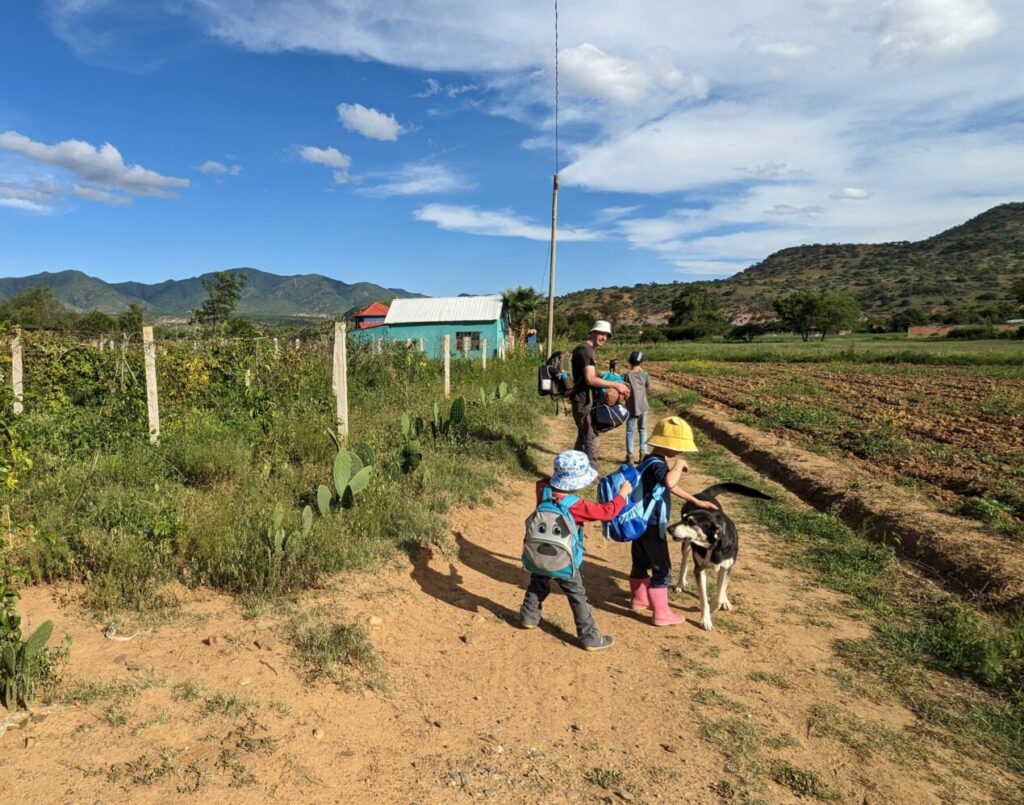
Drugged and Castrated
Sadly, Brown Dog could not stay. Our hosts were concerned about the trouble he was causing amongst the neighbors. He also posed a threat to the other dogs. They could easily end up accidentally (or intentionally) poisoned along with Brown Dog.
They called the town vet and fed Brown Dog a sedative. They carried him off in a stupor, castrated him, and found someone willing to adopt him.
Brown Dog almost got a real name at this point. When our host’s partner told the vet his name was Rojo [Red], she misunderstood her American-accented Spanish and heard Rufo. Not a bad dog name, but it didn’t stick. From here on I’ll continue referring to him as Brown Dog.
The Permaculture Course
In a perfect world, a person could travel for free by volunteering their time in exchange for room and board. In the real world, feeding and housing a family of five cannot be compensated with farm labor performed by two information economy professionals. In South America, labor is cheap. It’s cash that they need. And here, they bring in their cash by having volunteers take their five day paid course. In the end, it’s still not a bad deal.
Every permaculture farm we’ve been at has its own flavor and emphasis. Eco Caminhos worked to develop a thriving business model with agroforestry, while simultaneously providing a home and career to troubled youth. Quinta Esencia, in Argentina, was more about social networking and big ideas. Here, our New Zealander host and teacher uses his two acre plot of land to tinker.
Our first three days of the course toggled between time at the marker board taking notes on the topics of water management, compost, and seeding complimentary crops in close quarters and mini-tours of the land where he showed us the concepts in practice. He demonstrated four or five different sprinkler heads, several composting methods, and his miniature water filtration plant made out of four rain barrels.
He showed us his swales — long, deep gashes in his field that his neighbors ridicule him for (how do you get the tractor through?). They stop rain water from running off the property, keeping the ground water well-charged for the dry season.
He pointed out his large coil of black pipe on top of his roof. A poor man’s solar water boiler.
After three days of course work, we took a day off. When we resumed, things got weird.
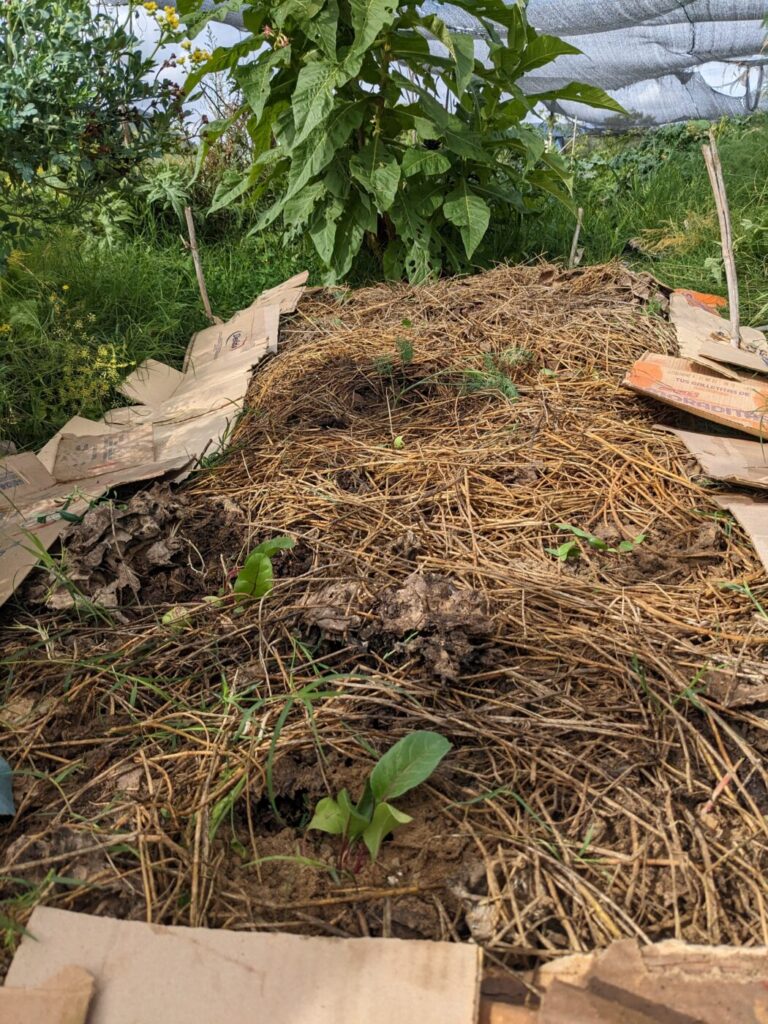
No COVID, No Climate Change
Liuan and I have had lengthy debates about climate change, the biodiversity crisis, and the plastic problem. Liuan thinks the only and best solution is to change they way we live. Consume less. Respect and preserve the land.
To me, those arguments often seem to imply that we must curb human ambition, which sounds to me like a losing prospect. I tend to think the answer is improving technology so that we harvest energy and make products without poisoning the earth. I tend to think that an abundant future, rather than an austere one, will ultimately win the day.
The permaculture farm seemed to hit the problem from both directions. Life at the farm is simple — almost beyond what an American can imagine. Every non-biodegradable product is reused: plastic drink bottles for storing home-fermented fertilizer, used cardboard for denying grass and weeds sunlight in preparation for garden expansion. Old tires are used for hinges, gaskets and trays where we mix mud plaster. They also used innovation to limit energy use: low-tech solar ovens (a black box with a mirror to reflect the sun downward), a coil of black pipe on the roof to generate hot water.
So we were stunned when our host explained to us that the warming climate is not caused by humans or CO2. The earth is warming due to a natural cycle. Carbon dioxide is the molecule of life! Climate change was devised by powerful elites to control us. Fifteen-minute cities will be the way they eventually constrict our freedom.
He then listed off other liberal movements — Black Lives Matter, gay rights, environmentalism, “wokeism” — as part of the same master plan to achieve a one-world order ruled by a secret cabal. COVID-19 was fake (as well as germ theory). The virus had never been “isolated.” The coronavirus was a premeditated crisis and all part of a grand scheme. Don’t be fooled, he admonished us.
We felt blind-sided and disoriented by all the seeming contradictions.
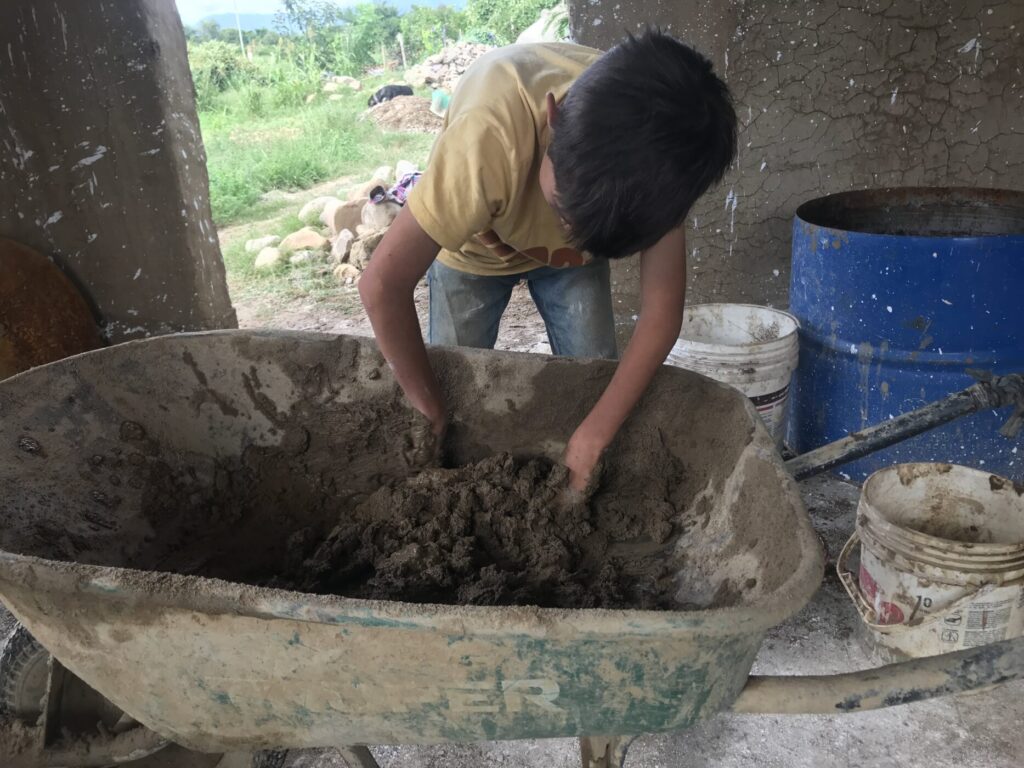
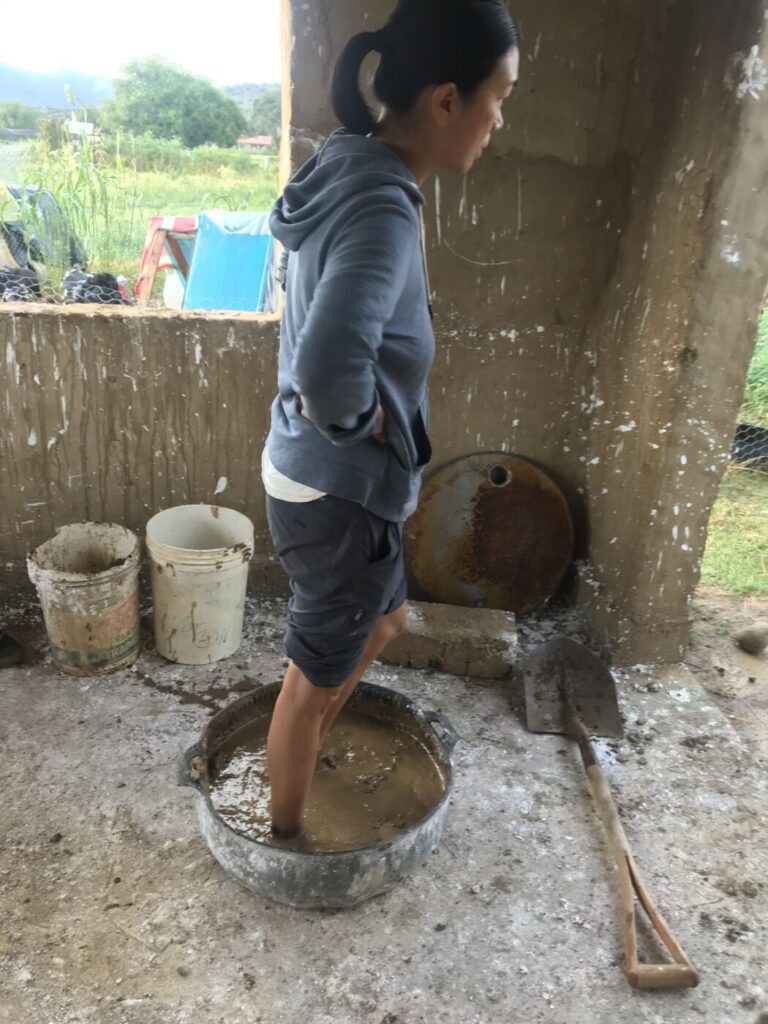
Morning Surprise
The morning after Brown Dog was hauled away, we woke up to a surprise.
At 6:15 in the morning, we were jolted awake by our alarm, yearning for more time in bed. Oliver, our nine-year-old boy, was first out the door of our little one-room cabin.
“What the?!?… It’s Brown Dog!”
We all piled out of the cabin amazed. There he stood, next to Rocky and Freddy still laying in their usual spot, the worn patio couch, wagging his tail.
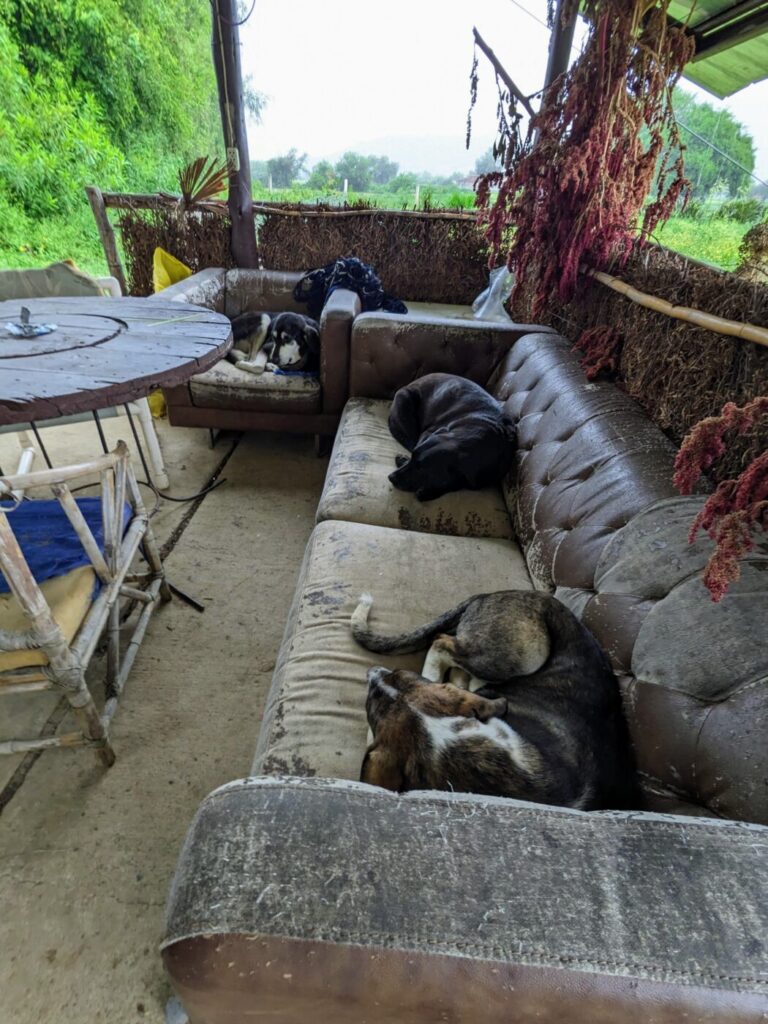
Back to the Vet
Our hosts were miffed that the vet had let Brown Dog loose. They texted the vet, asking if the new owner had a vehicle to carry Brown Dog away.
The vet was peeved too. “Are you making demands?” she replied.
Undaunted, our hosts drugged the dog and laid his limp body in the bed of their vehicle, which was a cross between a motorcycle and a pickup truck. The vet was out of town for the day. They dropped off the dog at the vet’s office, tied him up with a length of red rope that was lying around, and left.
Should We Stay Or Should We Go
Day five of the permaculture course was as strange as day four. But by then we were mentally prepared.
The topic was health. He contrasted between allopathic medicine, or science-based western medicine, and terrain theory, which holds that sickness and injury have more to do with the body’s overall health and fitness than some external cause like germs.
To me, the two sounded like they were both true. It’s like asking whether you were robbed because a thief entered your home (germ theory) or because you left the front door wide open (terrain theory). However, our host was certain that only one theory was true, despite scientific claims to the contrary.
To be honest, Liuan and I were not just shocked, but a bit frightened. Who were these people we were staying with? We briefly considered leaving early. But in the end, we decided to stay for the time we had committed to.
Our fear had more to do with the way our society has collectively demonized each other than any real threat we faced. Just as our host assumes that liberals, progressives, and elites are conspiring to control and ultimately “flip the switch” on everything we rely on (banks, internet, essential services), people of our ilk consider those who believe in the conservative conspiracy worldview as malevolent and dangerous.
Maybe it was just a coincidence, or maybe it signifies an emerging trend, but I came across a recent article in the New York Times profiling Thomas Massie, Republican representative from Kentucky. His back-to-the-land and local community lifestyle combined with a paranoid level of distrust in government and anything that smacks of elitism sounded very familiar by now. It helped clarify how being uber-green and earth-loving, but vehemently against environmental policy, fit together into one ideological package.
By now, I felt like I could step into that logical universe without getting disoriented.
As it turned out, we had nothing to fear about our host and his partner. The same couldn’t be said of the neighbor’s bull terrier.
Sneak Attack
The center of the closest village lies conveniently within walking distance from the farm. We had taken a family walk into town an hour before supper to handle a few errands and enjoy the cooling temperature and dusk sky.
It was dark by the time we turned off the main highway and onto the dirt road that led home. By then we were familiar with the series of turns and forks we had to follow and didn’t bother carrying a flashlight. The full moon illuminated the path.
Out of nowhere, a white body scampered behind me and clamped its teeth onto my calf. After a moment, it let go and continued on its bat-out-of-hell trajectory into the brush.
I had been bitten by the neighbor’s bull terrier.
Lost Expanders
My family were terrified. They ran up the road, crying and screaming.
I, on the other hand, despite being the victim, found my fear was erased by anger. I limped over to catch up to my other family members.
Finley, our six-year-old boy, realized he had lost his upper expander (an orthodontic device to expand his palate). It had ejected out of his mouth onto the dirt road when he had screamed and run.
I turned on my iPhone’s flashlight and limped back over toward the evil snarling dog. I searched for the small, but expensive and irreplaceable, piece of pink plastic in the dark. I had so much adrenaline boiling in my veins that I felt more than happy to square off with my attacker. His teeth versus the toe of my size-twelve boot.
Rocky (one of the dogs from our farm) heard the commotion and came trotting over to restore order. He calmly policed the perimeter, like my personal body guard.
The bull terrier was more confident when he had the element of surprise. Probably sensing my and my canine ally’s lack of fear, he continued to bark but backed off and kept his distance while I calmly invaded his territory.
With one eye to the ground and one eye on the white dog, I found what I was looking for.
An Unfortunate But Apt Name
Our hosts already knew something was up before we arrived. Our family made our way to the farm’s dining table under the lit patio visibly shaken.
I showed them the indentations in my leg. They would have been bleeding puncture wounds if I hadn’t been wearing a sturdy pair of pants.
“Was it Bastard?” our hosts inquired.
“Yeah, he really was a bastard… what do you mean?” I said, a bit confused.
We described the mid-sized, white dog with the ugly triangular face. “Yep, that’s Bastard. That’s his actual name.” And it wasn’t the first time he had bitten someone. Our host had been bitten recently while riding his moto. Bastard’s owner was the same “enemy” neighbor who had threatened to poison Brown Dog.
Our hosts were sympathetic and indignant about the incident. They were also kind of happy about it. Some of the neighbors wanted our host to tie up his dogs, something our hosts were loath to do. They were planning to take it before the local syndicate to get an official ruling. Now our hosts had a counter-argument: their dogs had never bitten anyone.
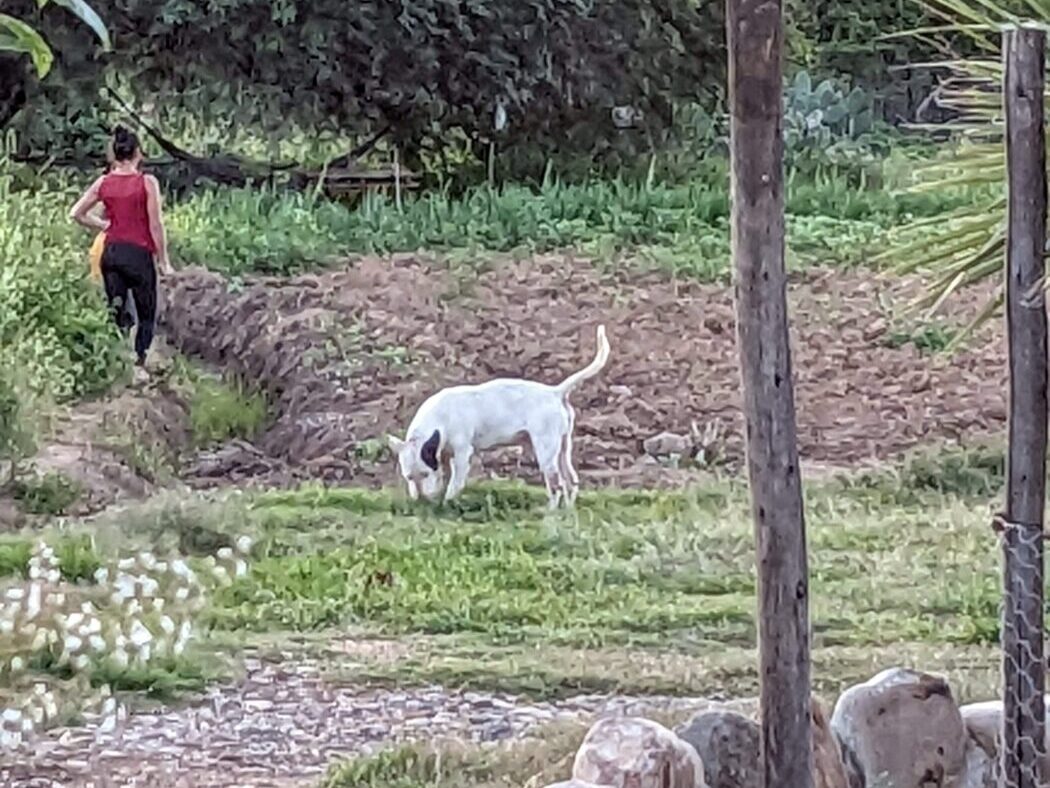
Keeping It Local
The local syndicate is a collection of fifty neighboring land-owners that share the private dirt access roads and irrigation trenches that provide the water critical to their way of life. They make rules, maintain their shared infrastructure, and judge between bickering neighbors — all outside of official government institutions. They often trade resources and lend each other items as needed.
In these parts, everybody except for our foreign born hosts is indigenous. They conduct their syndicate meetings in the native Quechua, not Spanish, making it difficult for our hosts to understand unless someone translates.
Despite the challenges, this local stewardship of resources and keeping of the peace is at one with our host’s philosophy. He was initially attracted to the region by the outcome of the Cochabamba Water War: a grass roots protest against the foreign privatization of their water utility.
The protesters ultimately prevailed. It is now written into law that water is a basic human right and that communities that have always managed their own water can’t have it taken away and sold.
Local Good, Government Bad
To sum up our host’s world view: the more overarching the governing institution, the more corrupt are its leaders, the more damaging its decisions, and the more people’s rights are trampled upon. The belief in global conspiracies, the denying of scientific consensus, living off the land, and settling matters locally all stem from an absolute belief in the old adage: power corrupts.
Rather than waste your energy pining for global solutions where you exert a vanishingly miniscule influence, our host preaches empowerment that comes with focusing on the health of your own land and local community.
I wasn’t convinced that the world is run by a secret, well-organized cabal executing a cunning, documented roadmap to global domination. I tend to think our world is more chaotic and complex than that.
Our global problems are real, like it or not, and emerge from billions of individuals carelessly, but understandably, pursuing their short-term interest. People bumble into catastrophe, even as they earnestly seek solutions. Regardless, I was persuaded by his call to focus more of our attention where we have the power to act, our own communities.
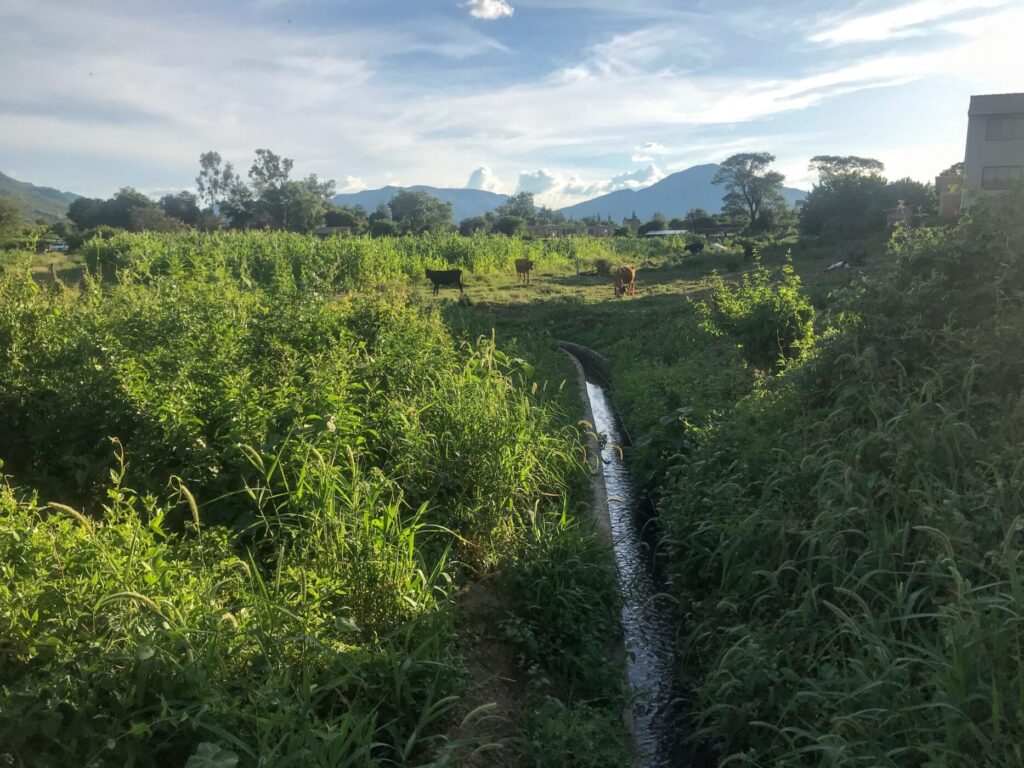
Morning Surprise II
We woke up to another morning of work. At 6:30 we shoved open the wooden door to our cabin to get to the business of feeding the animals and making breakfast for all the volunteers.
Brown Dog greeted us on our patio. He had escaped again. His tail was wagging, a thin red rope hanging from his neck.
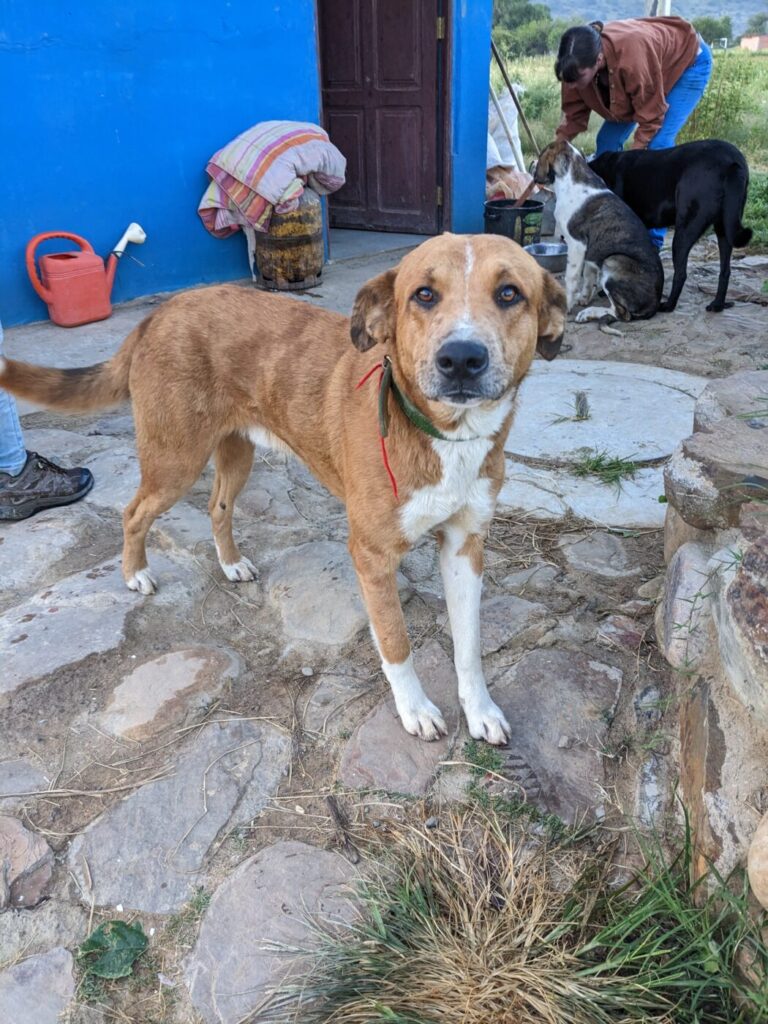
Sneak Attack II
Brown Dog was drugged and hauled off in the moto for a third time. Our hosts brought a metal chain.
That same evening, one of our fellow volunteers, a young French man, limped up to the outdoor dining table looking shaken and upset. “I can’t believe it, Bastard bit me!”
It was another sneak attack. No barking to warn his victim to stay away. Just a lightening ambush of teeth and a hasty retreat into the bushes. To make matters worse, he was wearing shorts. Blood dribbled down his leg from a circle of puncture wounds.
That was twice in one week.
Our host started doing some research to see if there were any Bolivian laws regarding this situation. It turned out there was. Certain races of dog, including Bull Terriers, were restricted. The dog’s owner was required to register it with the local police and get insurance. The neighbor had certainly not done those things.
This was another ace up our hosts’ sleeve if said neighbor insisted that the syndicate rule against his own dogs. My bite happened on Wednesday, and the French traveler’s bite happened on Friday. The syndicate meeting was on Sunday. It seemed we were in for a law and order spectacle.
A Clash of Worldviews
A debate split the dinner table. Our host and his partner, usually in lock-step, were on opposing sides.
Everyone agreed on the facts. We had two bite victims. Try as he might, the “enemy” neighbor had not provoked Rocky, Freddy, or Mason to a physical attack. The law was on our side. The neighbor was not going to tie up his dog voluntarily. Someone else would eventually get bitten.
Where the disagreement lay was on what to do about it.
Our host was determined to stick to the local syndicate’s justice and enforcement. He was certain they would rule that the neighbor must tie up his dog. He conceded that the neighbor might not comply, and that this might lead to another bite.
And that’s where his partner disagreed. The police should be notified immediately. The neighbor was on the wrong side of the law, and we were just inviting tragedy by not using the force of law to resolve the matter. It needed to stop now.
Our host put his foot down. He would let the local process play out. We didn’t need to rush to the government like a tattling toddler to solve a problem among neighbors. Was it likely the neighbor would comply? No. But for the sake of staying in the good graces of the local social web, he had to give the neighbor, and the community, a chance.
Bodyguards
Rocky and Freddy put their heads together and devised their own solution. (Mason was too immature to have a voice in the decision). It was their responsibility to keep the humans safe. Their charges were getting hurt. From now on they would escort any volunteer up to the highway whenever they set off to town by foot.
One day I left the farm to pick up some mended clothes from the seamstress located in the central market. Freddy and Rocky flanked me on both sides like my own secret service agents. Mason, not wanting to be left out, bounded goofily behind.
Bastard stayed put in his yard.
As we got closer to the highway, another set of big brown dogs got feisty. Rocky and Freddy calmly marched beside me standing their ground. But Mason blinked. He took off running back toward the farm. The two big brown dogs tore after him, relishing the chase.
Rocky and Freddy looked at me, and then to their foolish farm-mate about to get pummeled. Mason needed more help. They took off and caught up. The brown dogs were outnumbered and came lumbering back to their post, satisfied with their effort.
I didn’t dare resume my walk until Rocky and Freddy took their places by my side.
The Syndicate Meeting
Liuan, having a masters in sociology, was intrigued by the syndicate meeting and asked to observe. Yes, she could. Liuan and I lay in bed the night before, giddily speculating about the juicy spectacle she was about to witness.
Sunday morning at nine, Liuan carried her plastic chair to the junction of our farm’s driveway and the adjoining dirt road that led to the highway. There was no spectacle. The meeting was a long, dry administrative affair. They read off and verified all the communal expenses accrued over the last year: 5 Bolivianos for two beers (1B = $0.15), 7 Bs for a notebook, ad infinitum.
The juiciest dispute regarded the former chief that tried to pay his fines for missing central syndicate meetings out of the communal fund. Our host decided to bring up the dog drama later.
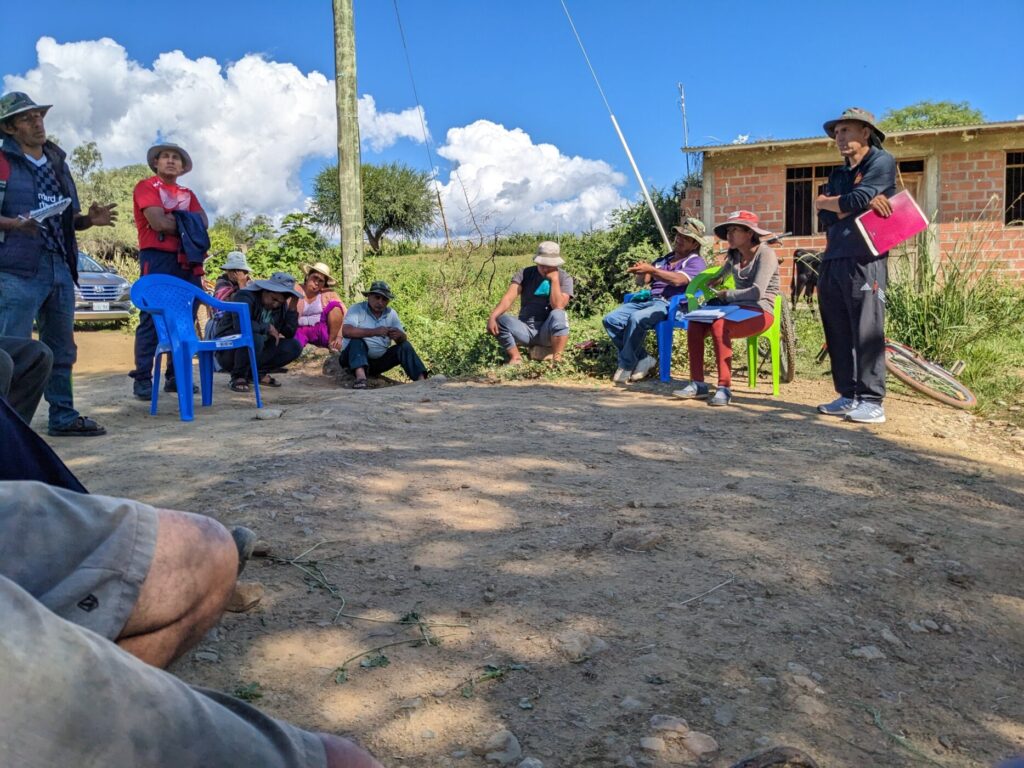
Only At Home, Not In the Street
The dog matter was handled over private phone calls and discussions between the neighbor and key members of the syndicate. They ruled that the neighbor would have to control Bastard. He couldn’t keep biting people.
As one friendly neighbor remarked, “los perros son para la casa, no para la calle [dogs are for the home, not the street].”
Surprisingly, it seems the neighbor complied, at least for the time being. All of us were on high alert whenever we passed by Bastard’s territory. We never saw him. The times we did see him, he was by his owner’s side.
Return of the Brown Dog
I lost count of how many mornings we woke up to find that Brown Dog had found his way back to the farm.
Sadly, he just couldn’t stay. Our host taught my son and I how to use the sling shot. “You don’t have to hurt him. Just scare him away.”
Neither my son or I had the heart to fling rocks at the banished creature.
When Your Ideological Opponent Is a Highly Evolved Person
After those awkward last two days of the course, we still had a week and a half to participate in life on the farm. We were worried it would be tense and uncomfortable.
Despite his off-putting ideological claims, our host was one of the most agreeable people I’ve ever worked for. He never got angry or blamed volunteers for honest mistakes. (I tested this by accidently breaking his main water line with a posthole digger on the first day. The second day I wasted a triple batch of pancake batter, which is a long and funny story for another time.)
Unlike most “bosses” he didn’t just assume we should know what to do — and didn’t get annoyed when we didn’t. He patiently explained until we got it and was never too busy to take a question.
Despite our opposing assumptions and different lifestyles, I never felt personally judged. Though, I never pressed my points of view.
Our host was always up for a game at the dinner table, to the delight of my oldest son. He even roped me, a lifelong game-hater, into a few games of chess, and “Buddy, Don’t Get Angry” (a more strategy-intensive version of the classic, Sorry). I hate to admit it, but I had fun!
Even his ideology, once you sidestepped some of the landmines, had much to teach me.
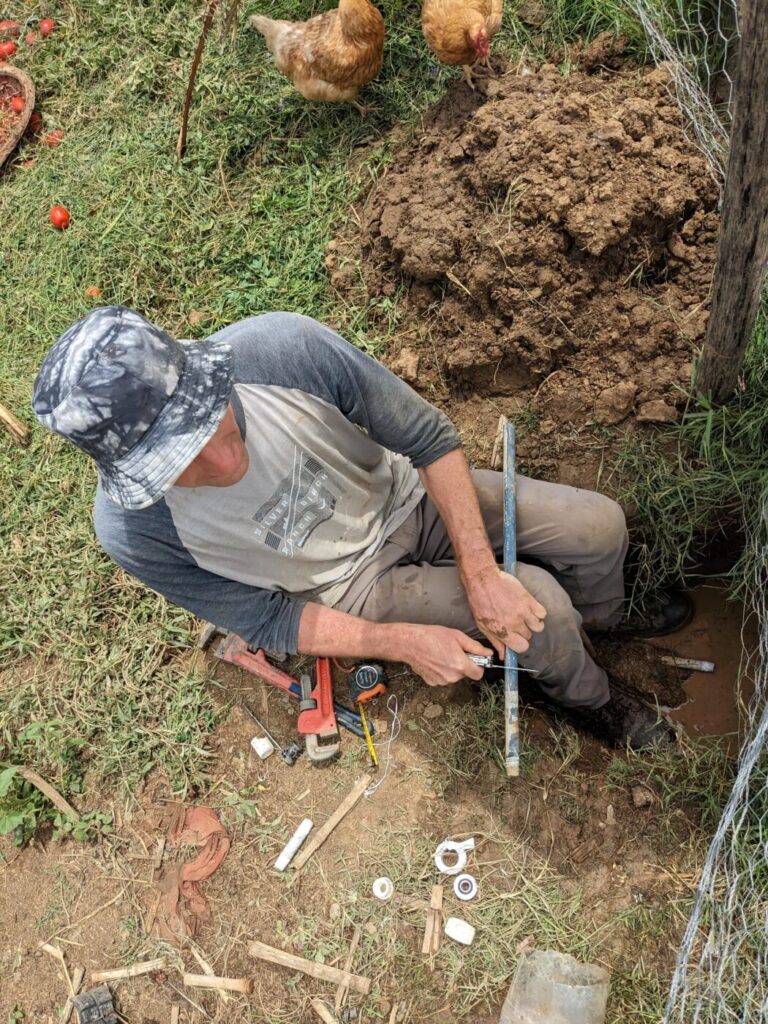
Of Concern and Influence
Other than his views on hot-button political issues, I deeply respected and found I had a lot to learn from his approach to life. When I asked him if he sold any of the yield from his farm, he replied that he certainly could, but that his first priority was living well. I couldn’t disagree.
Here is a man who truly lives what he believes. Out of his deep respect for the indigenous people of Bolivia — their ability to stand up for themselves, and their active local engagement — he lives among them and defers to their customs.
He might believe human-caused climate change is just a ploy on the part of the global elite. But he is cleareyed about the trends — the drying rivers, exhausted water tables, collapsing biodiversity, the degradation of soil by toxic pesticides and fertilizers — and is forgoing the comforts of modern life to develop adaptive and preventative solutions.
I might “think the right thoughts” about climate change, but am I empowered to move the needle? I keep coming back to the illustration he made on the whiteboard with a big circle representing our “concerns.” Inside, he drew a smaller circle that stood for our influence.
It’s an paradigm shift from thinking that having the right view and voting for the right party is enough. Is that really the extent of my influence? Or are there areas I’ve overlooked where I could live more fully into my beliefs and values?
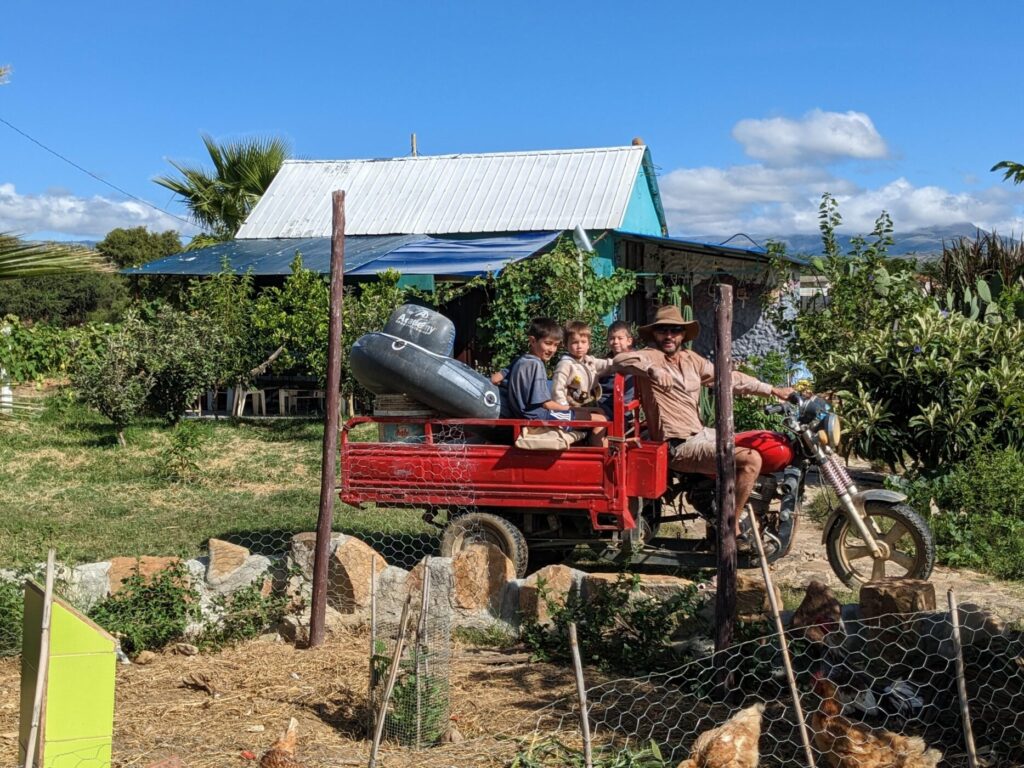
Touring the town and countryside on the back of the red moto was one of our favorite things to do.


